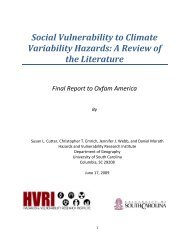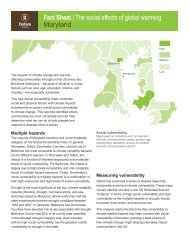Poverty Footprint Study on how the Coca Cola - Oxfam America
Poverty Footprint Study on how the Coca Cola - Oxfam America
Poverty Footprint Study on how the Coca Cola - Oxfam America
You also want an ePaper? Increase the reach of your titles
YUMPU automatically turns print PDFs into web optimized ePapers that Google loves.
Engage with NGOs and financial groups to discuss<br />
providing microfinance to SMEs in <strong>the</strong> <strong>Coca</strong>-<strong>Cola</strong>/<br />
SABMiller value chain, perhaps with a particular<br />
focus <strong>on</strong> women.<br />
Engage with Zambia Sugar, El Angel and Central<br />
Izalco to explore providing technical assistance,<br />
training and financing to sugar growers.<br />
Women’s ec<strong>on</strong>omic empowerment<br />
The research dem<strong>on</strong>strated that women c<strong>on</strong>tinue to<br />
be excluded from many ec<strong>on</strong>omic opportunities and<br />
tend to dominate <strong>the</strong> large informal retail sectors in<br />
both Zambia and El Salvador, where <strong>the</strong>y run small<br />
shops adjacent to or in <strong>the</strong>ir homes. As discussed<br />
in <strong>the</strong> report, many women reported that <strong>the</strong>y find<br />
it difficult to grow <strong>the</strong>ir businesses due to a lack of<br />
access to credit, particularly in Zambia.<br />
In September 2010, The <strong>Coca</strong>-<strong>Cola</strong> Company<br />
announced 5 by 20, an initiative to empower 5 milli<strong>on</strong><br />
women entrepreneurs in <strong>the</strong> <strong>Coca</strong>-<strong>Cola</strong>/SABMiller<br />
value chain by 2020. The Company recognizes <strong>how</strong><br />
valuable women are to <strong>the</strong> <strong>Coca</strong>-<strong>Cola</strong> business<br />
and has committed to finding ways to help <strong>the</strong>m<br />
grow <strong>the</strong>ir businesses. The Company will provide<br />
opportunities for ec<strong>on</strong>omic empowerment in an effort<br />
to help women generate more income and begin to<br />
move <strong>the</strong>ir families out of poverty. In additi<strong>on</strong>, 5 by 20<br />
will provide training and capacity building activities<br />
and financing schemes so as to equip women for<br />
<strong>the</strong> workplace and allow <strong>the</strong>m to grow and sustain<br />
<strong>the</strong>ir businesses. In light of this report, The <strong>Coca</strong>-<br />
<strong>Cola</strong> Company will make a special effort to direct 5<br />
by 20 efforts to empower women in Zambia and El<br />
Salvador.<br />
Our research s<strong>how</strong>ed that governments have a<br />
crucial role to play in developing nati<strong>on</strong>al goals<br />
and strategies to assist women to become more<br />
ec<strong>on</strong>omically empowered, but <strong>the</strong> private sector can<br />
play an important role in catalyzing <strong>the</strong>se changes.<br />
In light of this, <strong>the</strong> Company aims to build <strong>on</strong> <strong>the</strong><br />
business training it currently offers and leverage<br />
initiatives to support more women in <strong>the</strong> value chain.<br />
It is also recommended that both companies:<br />
Make an increased effort to recruit women for<br />
n<strong>on</strong>traditi<strong>on</strong>al and senior management jobs.<br />
C<strong>on</strong>sider ways to increase women’s access<br />
to credit, taking into account <strong>the</strong> unique<br />
circumstances women face in running businesses<br />
in <strong>the</strong>se communities.<br />
Community access to water<br />
Water has become a priority issue for many<br />
development practiti<strong>on</strong>ers who recognize <strong>the</strong><br />
potentially devastating impact of water stress <strong>on</strong><br />
poor communities. Companies that depend <strong>on</strong><br />
water for <strong>the</strong>ir operati<strong>on</strong>s–such as The <strong>Coca</strong>-<strong>Cola</strong><br />
Company and SABMiller–also recognize that <strong>the</strong><br />
resp<strong>on</strong>sible use of water is a key business issue.<br />
Both SABMiller and The <strong>Coca</strong>-<strong>Cola</strong> Company have<br />
made internati<strong>on</strong>al commitments to use and replace<br />
water resp<strong>on</strong>sibly. Building <strong>on</strong> <strong>the</strong>se commitments,<br />
we recommend that both companies:<br />
Publish independent analyses indicating <strong>the</strong><br />
safety of water discharged from <strong>the</strong> bottling plants<br />
<strong>on</strong> a regular basis.<br />
Encourage water-intensive suppliers to implement<br />
best practice policies and practices <strong>on</strong> water.<br />
Carry out a comprehensive analysis of water<br />
impacts al<strong>on</strong>g <strong>the</strong> value chain in both countries.<br />
C<strong>on</strong>duct analysis to ensure that water use does<br />
not negatively impact local water availability, and<br />
evaluate whe<strong>the</strong>r improved pricing for water may<br />
address demand issues.<br />
Advise o<strong>the</strong>r companies, <strong>the</strong> government and<br />
<strong>the</strong> local community to collectively tackle water<br />
polluti<strong>on</strong> by reducing dumping and improving<br />
clean-up of <strong>the</strong> San Ant<strong>on</strong>io River in Nejapa.<br />
What we have learned<br />
The overall process leading to this report has been a<br />
source of learning for all our organizati<strong>on</strong>s. We have<br />
no doubt that civil society, government and business<br />
can form strategic partnerships that leverage <strong>the</strong><br />
unique skills, resources and influence of each sector<br />
and that <strong>the</strong>se partnerships are vital to address<br />
today’s development challenges effectively.<br />
We found that in order to realize <strong>the</strong> potential of<br />
our partnership, it was important to invest time and<br />
energy in building trust am<strong>on</strong>g our organizati<strong>on</strong>s and<br />
specifically across <strong>the</strong> project team which worked<br />
directly <strong>on</strong> <strong>the</strong> initiative. We also required str<strong>on</strong>g<br />
leadership and a clear organizati<strong>on</strong>al mandate to<br />
support our involvement in <strong>the</strong> collaborati<strong>on</strong> and to<br />
overcome <strong>the</strong> differences in our instituti<strong>on</strong>al cultures.<br />
NGOs, such as <strong>Oxfam</strong>, are well positi<strong>on</strong>ed to provide<br />
a “development perspective” <strong>on</strong> value chain impacts<br />
and to draw attenti<strong>on</strong> to important social issues such<br />
as poverty. The <strong>Oxfam</strong> poverty footprint methodology<br />
provides an initial investigative step toward <strong>the</strong><br />
ultimate goal of increasing social benefits throughout<br />
value chains. However, <strong>the</strong> poverty footprint analysis<br />
al<strong>on</strong>e cannot point to specific soluti<strong>on</strong>s to address<br />
<strong>the</strong>se multidimensi<strong>on</strong>al issues. To achieve systemic<br />
change, <strong>the</strong> necessary strategic, operati<strong>on</strong>al and<br />
policy changes must be devised by <strong>the</strong> private sector,<br />
civil society and government working toge<strong>the</strong>r.<br />
The project c<strong>on</strong>firmed our collective view that <strong>the</strong><br />
private sector can play a large role in c<strong>on</strong>tributing<br />
to poverty alleviati<strong>on</strong>. Companies, and particularly<br />
multinati<strong>on</strong>al corporati<strong>on</strong>s, are uniquely positi<strong>on</strong>ed<br />
to share business expertise, capacity and resources<br />
to benefit communities in developing countries.<br />
Fur<strong>the</strong>rmore, NGOs can use poverty footprinting to<br />
better understand market impacts and opportunities<br />
for people throughout different value chains, create<br />
new platforms for stakeholder-driven change,<br />
and improve transparency around private sector<br />
community impacts.<br />
Exploring <strong>the</strong> links between internati<strong>on</strong>al business and poverty reducti<strong>on</strong> 79




